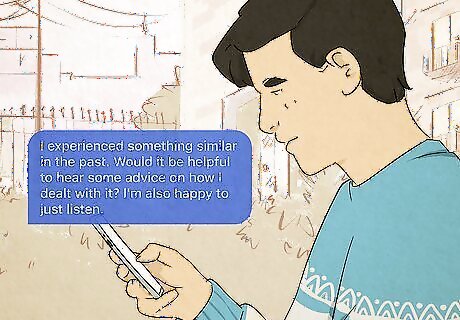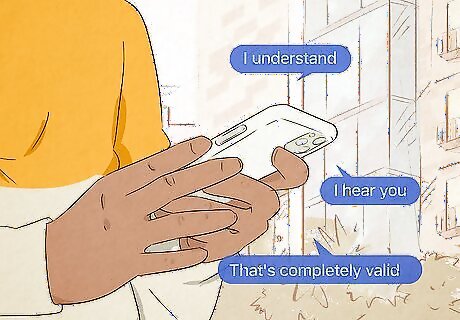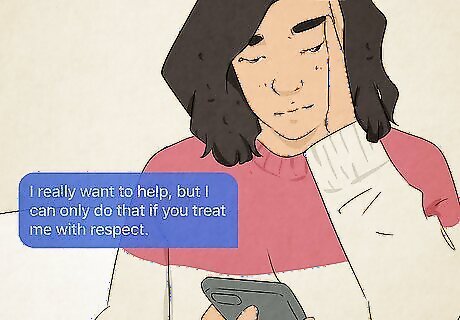
views
- Try to validate them in an empathetic and kind way so that they know you’re on their side.
- Ask plenty of follow-up questions to get a full picture of what’s going on.
- Don’t offer unsolicited advice; before you give any tips or suggestions, ask them if they’re open to it.
- Meet them in person or call them to avoid any tonal misunderstandings.
Find out why they're upset.

It will be easier to calm them down if you know why they're angry. Read their texts carefully to understand their point of view, and ask clarifying questions if you're not sure what's made them so upset. It will help you handle the situation if you know exactly what's angering them, and it'll make your loved one feel better knowing that you're taking the time to listen to them. Phrase clarifying questions carefully so that they know you genuinely just want to understand them better. Try something like, "I'm so sorry that you're feeling this way. Can you tell me more about what happened?" If they're angry at you and you're not sure why, you might text, "Could you tell me what I did or said that's made you feel this way? I just want to know more so we can resolve this."
Validate their perspective.

Use empathetic statements that affirm their point of view. Oftentimes, people who are angry will start to cool off if someone tells them that their feelings are justified. Acknowledge the other person's feelings, be empathetic towards them at least tell them that you understand where they're coming from. It will likely defuse the situation. Let's say a family member is angry and venting to you about something that happened to them. To respond, say something like, “I’m so sorry that happened :( It makes total sense that you would be upset.” Perhaps the family member is upset with you. To affirm their point of view, you might say, "It's completely understandable that you would feel that way.”
Apologize if you made a mistake.

If you messed up, it's best to take responsibility for your actions. Everyone makes mistakes, and it will help your loved one feel better to know that you're sorry. To give a genuine apology, use "I statements" to take ownership of your behavior, and avoid making excuses or placing blame on the person who is upset with you. Express remorse for your actions and follow that with a sincere promise to do better in the future. Maybe your close friend is angry with you for forgetting to invite them to a group hangout. Text them, "I'm so sorry. I should have invited you and there's no excuse. Next time we all hang out I promise to make sure you feel included."
Ask them questions about their feelings.

This gives your friend, family member, or partner space to vent. Ask them how they felt in the moment of the experience and how they're feeling now. You can also ask them what they need to make the situation better and if there's anything you can do to help them. Even if they're upset at you, offering to help them shows that you care and can dissipate their anger. Text them something like, "That sounds like a really difficult experience! How are you feeling now?" or "I'm so sorry this happened. Is there anything I can do to help?"
Check if they want advice before you give it.

Advising if they’re not ready to hear it may make them angrier. Ask if there is anything you can do to help, but refrain from offering unsolicited opinions on the situation. Most likely, your friend or loved one just needs some time to vent and voice their frustrations. Send them a text such as, "I experienced something similar in the past. Would it be helpful to hear some advice on how I dealt with it? I'm also happy to just listen." Offering advice before the person is ready may make them feel like you're minimizing or writing off their feelings with a quick solution. If they say they're not ready or interested in advice, let them know that the offer still stands if they ever want to hear it in the future. Marshall B. Rosenberg Marshall B. Rosenberg, World-Mediator When facing another's anger through text, remember unmet needs underlie all emotions. Listen past the words to discern those needs. Then respond softly, validating feelings while firmly de-escalating harmful behaviors, steering discussion toward peaceful resolution. Meet escalation with grounded calm, seeking shared understanding rather than reacting defensively. This graceful approach can diffuse tension, opening the door to address the root concerns driving their frustration.
Offer a solution.

See if there's anything that can be done to resolve the situation. Ask permission first so that your loved one doesn't feel like you're dismissing their feelings. Then, offer a solution that applies to the situation they are upset about. If they are angry at you, don't focus on being right or getting back at them. Instead, try to come to a resolution that makes you both happy. Ask for consent to offer a solution with a text like, "Is there anything we can do to resolve this? I would be happy to do anything to make this better." If they agree, suggest a solution. Perhaps your roommate is upset that you haven't been helping them clean the apartment. Text them, "I can start picking up the slack at the apartment. Maybe when I get home we can make a chore chart." If your friend is angry that you haven't been initiating plans as often, try, "I love hanging out with you and want to spend more time together, too. Would you want to make a weekly coffee date to catch up from here on out?" Perhaps they're not ready to find a solution. Tell them that you would be happy to resolve the situation later on if they change their mind.
Reread your responses before you hit "send."

An angry person may be especially sensitive to what you say. Avoid sending the first thought that comes to your mind, especially if you are stressed, flustered, or angered by the text they sent you. Try to remember how much you care about this person and choose your words carefully. You might try reading over your responses before you hit send. This will help you avoid sending an angry text yourself. Draft your responses in the notes section of your phone if you don't want them to see you typing.
Be mindful of your text tone.

Pay attention to your use of words, punctuation, and emojis. Use each of these to help your texts come off as empathetic, calm, and kind. Avoid one-word or curt responses that could potentially be misunderstood as passive-aggressive or hostile. Use positive, empathetic, and encouraging language, i.e. "I understand," "I hear you," and "That's completely valid." Avoid ending sentences abruptly with a period. Though in most instances, a period is totally fine and grammatically correct, don't end texts like "Fine." or "Okay." with a period. This could make the person think you're angry or upset. Use emojis to convey a calm, positive tone. If you're trying to comfort someone, use a smiley face along with your encouraging message. Perhaps you're upset that you angered a friend. Add a sad face to convey your genuine remorse.
Remain calm yourself.

Matching their anger or getting upset may escalate the conversation. If they're responding rudely or using a harsh tone of words, keep your texts polite and neutral. Maintaining a helpful, positive attitude can help deescalate the situation, whether they're mad at you or angry about something else. Whether you're texting a good friend, your significant other, or your sister-in-law, give them the benefit of the doubt and remember how much you care about them. A person who is at the height of their anger usually isn't thinking clearly. They may come to regret the way they expressed their anger once they start to calm down.
Set boundaries if their anger is escalating.

Let them know that you can’t keep texting unless they respect you. Being angry does not give someone the right to mistreat you. If they are being particularly rude, text them that they have to speak to you with respect if you want to keep texting. Alternatively, if their anger is particularly intense and you need a breather, you're allowed to take a break from texting. Text them, "I really want to help, but I can only do that if you treat me with respect." If you need a break or can't keep texting, say something like, "I'm really sorry that you've been going through this today. I'm going to have to step out, but we can definitely keep talking about this tomorrow."
Arrange to meet in person if you can.

If you can't, try a phone call. If you still need to work things out and the text conversation isn't going smoothly, you may need to speak in person or over the phone to resolve the issue. Text your friend, partner, or family member that you would be happy to talk further, but that you don't think you can keep communicating over text. Text them something like, "I really want to help, but I think it would be best if we had this conversation in person." If you're not able to meet, text, "Could we talk about this over the phone? I really want to work this out, but I feel like I can't communicate how I feel over text."














Comments
0 comment